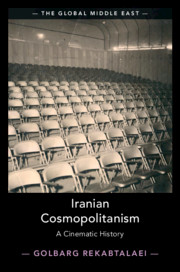Book contents
- Iranian Cosmopolitanism
- The Global Middle East
- Iranian Cosmopolitanism
- Copyright page
- Dedication
- Contents
- Notes on Transliteration, Citation, Translation and Dates
- Figures
- Acknowledgements
- Introduction
- 1 Cinematic Imaginaries and Cosmopolitanism in the Early Twentieth Century
- 2 Cinematic Education, Cinematic Sovereignty
- 3 Industrial Professionalisation
- 4 “Film-Farsi”
- 5 Cinematic Revolution
- Conclusion
- Index
1 - Cinematic Imaginaries and Cosmopolitanism in the Early Twentieth Century
Published online by Cambridge University Press: 11 January 2019
- Iranian Cosmopolitanism
- The Global Middle East
- Iranian Cosmopolitanism
- Copyright page
- Dedication
- Contents
- Notes on Transliteration, Citation, Translation and Dates
- Figures
- Acknowledgements
- Introduction
- 1 Cinematic Imaginaries and Cosmopolitanism in the Early Twentieth Century
- 2 Cinematic Education, Cinematic Sovereignty
- 3 Industrial Professionalisation
- 4 “Film-Farsi”
- 5 Cinematic Revolution
- Conclusion
- Index
Summary
With the emergence of new communication technologies, social spaces, novel practices, domestic conflicts, revolution and international wars in the first two decades of the twentieth century, the space of experience in Iran was constantly transforming. During this “new time,” cinema propelled a horizon of expectation, and in fact, a wide range of possibilities and futures for cinema audiences. Through cinema, actions in the present were informed by the past, and motivated by future expectations. As documents from the first two and a half decades of the twentieth century reveal, Iranian movie theatres predominantly featured international motion pictures in their programs, as no Persian-language short or feature film had yet been produced. Keeping in mind the “reflexive” quality of cinema that provided a cultural horizon in which the traumatic effects of modernity and modernisation were registered and articulated, one could extrapolate that the “aesthetic and sensorial” dimensions of cinema, processed through the act of spectatorship, inspired attitudes for the articulation and negotiation of national imaginations. The international moving pictures screened in Iran evoked a futural prospect of what Iran could and ought to be – a temporalisation of historical time on screen and in cinema space that characterised modernity in the early twentieth century. Much of the literature on early cinema in Iran has attended, in a rather dismissive tone, to the inundation of Iranian cinemas with international films, cinematic colonisation and henceforth the non-existence of an Iranian cinema industry; very little has been expressed in terms of the cinema culture that such cinematic events engraved in the Iranian imaginaries and cinematic visions. Through a genealogical investigation of cinematic activities during that era, this chapter argues for the shaping of a cinema culture that, relating to conditions of Iranian modernity, functioned to embody the global cosmos in its vernacular morphogenesis – a trait that came to bear upon Iranian cinema in various forms in the following decades.
- Type
- Chapter
- Information
- Iranian CosmopolitanismA Cinematic History, pp. 24 - 79Publisher: Cambridge University PressPrint publication year: 2019
- 1
- Cited by



